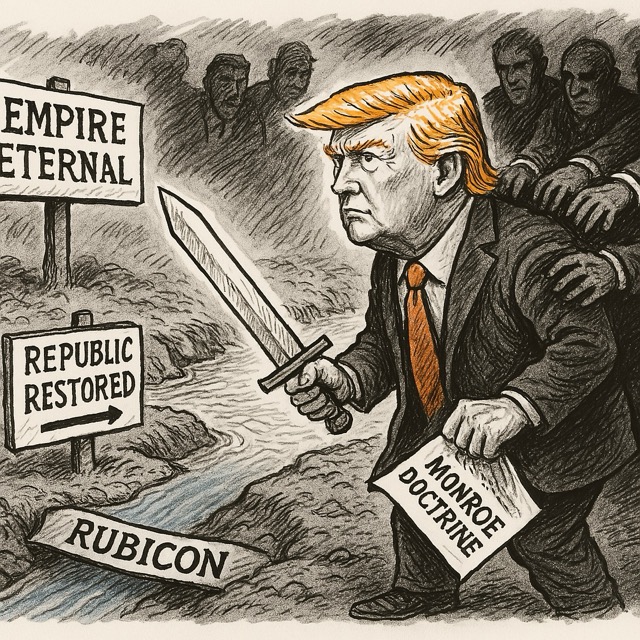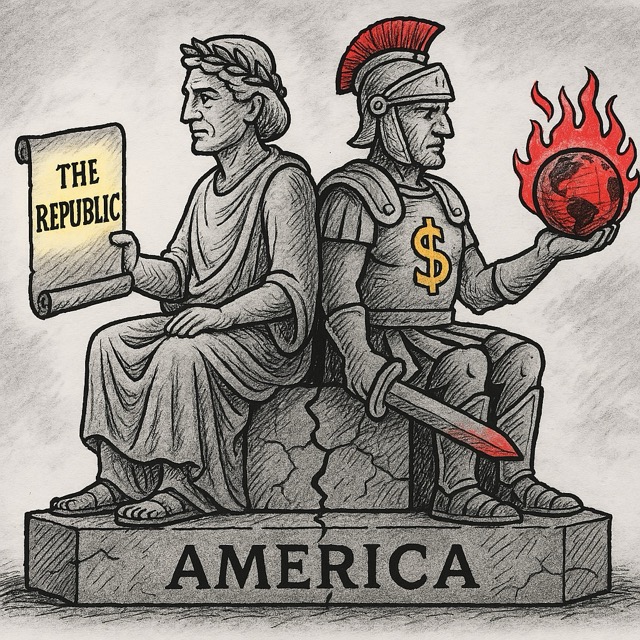The Hidden War for America’s Soul
America’s greatest battle was never fought overseas. It was fought — and still is — in its soul. Between the republic envisioned by its Founding Fathers, and the empire quietly constructed behind their backs. Between a nation meant to live by principle, and a system that learned to thrive on power.
From the moment the United States broke away from the British crown, it stood at a crossroads. Would it remain a republic of free citizens and local sovereignty? Or would it, step by step, war by war, become the new Rome?
1. The Republic the Founders Envisioned
The Founding Fathers feared empire. George Washington warned against permanent alliances. Jefferson distrusted standing armies. Madison warned that war was the enemy of liberty. Their dream was a country that would lead by example — not conquest. Commerce, not colonization. Freedom, not force.
Their model was the Roman Republic — before Caesar crossed the Rubicon.
2. The Empire That Grew Anyway
But empires don’t always arrive with flags and fanfare. Sometimes they wear the face of necessity. Of opportunity. Of fear.
From the Mexican-American War to the Spanish-American War, from World War I to Iraq, the U.S. has expanded its footprint through conflict. Not always by design — but rarely without benefit. Each war brought new powers to the presidency. Each crisis centralized authority. Each “defense” led to projection. Each victory planted bases that never left.
Today, America has over 750 military bases worldwide. That is not the footprint of a republic.
3. War: The Engine of Imperial Transition
The turning points are not subtle:
- 1917: Lusitania and World War I — a provoked entry
- 1941: Pearl Harbor — anticipated by intelligence
- 1964: Gulf of Tonkin — a false flag
- 2003: Iraq and WMDs — a manufactured pretext
Each one brought the same result: more power, more centralization, more reach.
The public was told it was for freedom. But freedom at home diminished with every expansion abroad.
4. The Hidden Hand: Finance, Influence, and the Empire Within
Many believe the American empire was shaped not just by generals or presidents — but by financiers, think tanks, and foreign interests. After the War of 1812, British financial influence never truly vanished. The City of London, international banking networks rooted in European financial power, and later transatlantic elites quietly promoted a version of America that would serve global stability — not national sovereignty.
The rise of Wall Street, the Federal Reserve, and the deindustrialization push were not accidents. They were shifts away from Jefferson’s agrarian dream toward Hamilton’s financial machine. America became the factory… then the market… and finally the balance sheet.
5. Trump, the Monroe Doctrine, and the Republic’s Last Breath?

Donald Trump’s presidency represented, in part, a rebellion against the imperial drift — challenging globalism through his foreign policy, reasserting the Monroe Doctrine, and clashing with the entrenched deep state narrative that had steered U.S. power outward for decades. By reasserting national borders, rejecting endless wars, and invoking the Monroe Doctrine, he tried to yank the republic back from the brink.
But the resistance he faced — from both parties, the media, and global institutions — reveals how entrenched the imperial vision truly is. His greatest sin may have been wanting America to be a country, not an empire.
6. The Real Civil War
The real war in America is not North vs. South, or Left vs. Right. It is Republic vs. Empire.
One side believes in sovereignty, limits, and law. The other in dominance, expansion, and control.
The Founders knew this risk. Rome warned them.
Conclusion: What Do You Want to Be?
You are not asked to choose between patriotism and peace — unless you accept empire as your destiny.
The question is not whether America will collapse from foreign invasion — but whether it will collapse from the weight of its own contradictions.
The Founders gave you a republic — a political identity rooted in sovereignty, civic virtue, and local power. If you want to preserve the American republic, you must recognize what threatens it. The empire waits to bury it.
Choose.
Sources
Lusitania (1915 – Entry into WWI)
- U.S. National Archives – RMS Lusitania Munitions Claims
https://www.archives.gov/exhibits/eyewitness/html.php?section=18 - Forbes – Sailing And Sinking The RMS Lusitania: A Century Of Lying America Into War
https://www.forbes.com/sites/dougbandow/2015/05/06/sailing-and-sinking-the-rms-lusitania-a-century-of-lying-america-into-war/
Pearl Harbor (1941 – Entry into WWII)
- Stinnett, Robert – Day of Deceit: The Truth About FDR and Pearl Harbor (Book) https://archive.org/details/dayofdeceit
Gulf of Tonkin (1964 – Escalation in Vietnam)
- NSA – Recent Revelations About the Gulf of Tonkin Incidents (Declassified PDF)
https://www.nsa.gov/Helpful-Links/NSA-FOIA/Declassification-Transparency-Initiatives/Historical-Releases/Gulf-of-Tonkin/ - The New York Times – Vietnam War Intelligence ‘Deliberately Skewed,’ Secret Study Says
https://www.nytimes.com/2005/12/02/politics/vietnam-war-intelligence-deliberately-skewed-secret-study-says.html
Iraq & WMDs (2003 Invasion Justification)
- NBC News – CIA’s final report: No WMD found in Iraq
https://www.nbcnews.com/id/wbna7634313

